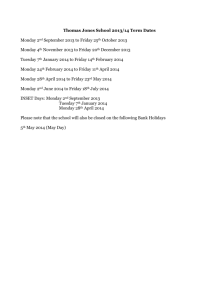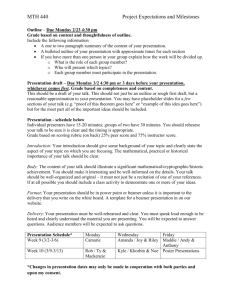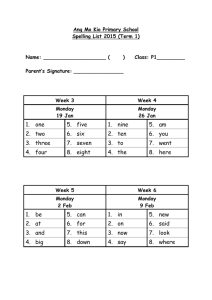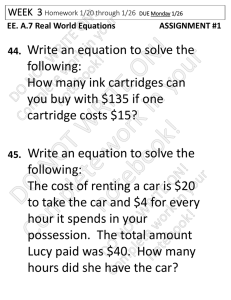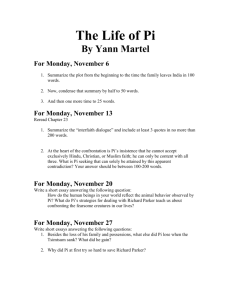Sociology 1 Ann Swidler Office - University of California at Berkeley
advertisement
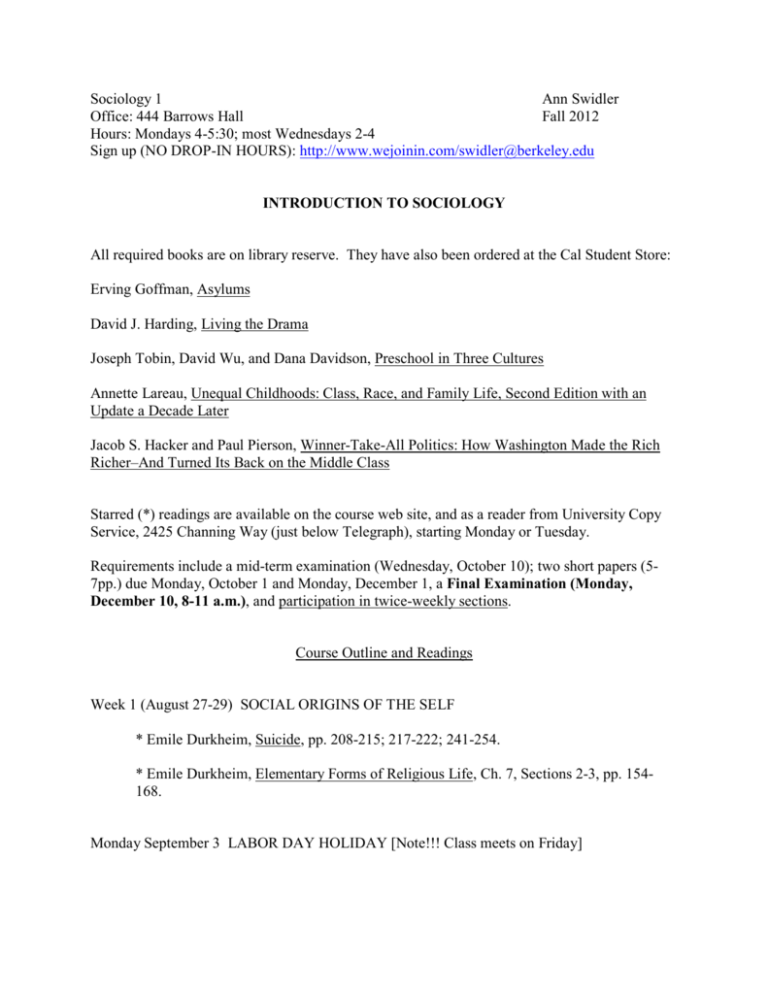
Sociology 1 Ann Swidler Office: 444 Barrows Hall Fall 2012 Hours: Mondays 4-5:30; most Wednesdays 2-4 Sign up (NO DROP-IN HOURS): http://www.wejoinin.com/swidler@berkeley.edu INTRODUCTION TO SOCIOLOGY All required books are on library reserve. They have also been ordered at the Cal Student Store: Erving Goffman, Asylums David J. Harding, Living the Drama Joseph Tobin, David Wu, and Dana Davidson, Preschool in Three Cultures Annette Lareau, Unequal Childhoods: Class, Race, and Family Life, Second Edition with an Update a Decade Later Jacob S. Hacker and Paul Pierson, Winner-Take-All Politics: How Washington Made the Rich Richer–And Turned Its Back on the Middle Class Starred (*) readings are available on the course web site, and as a reader from University Copy Service, 2425 Channing Way (just below Telegraph), starting Monday or Tuesday. Requirements include a mid-term examination (Wednesday, October 10); two short papers (57pp.) due Monday, October 1 and Monday, December 1, a Final Examination (Monday, December 10, 8-11 a.m.), and participation in twice-weekly sections. Course Outline and Readings Week 1 (August 27-29) SOCIAL ORIGINS OF THE SELF * Emile Durkheim, Suicide, pp. 208-215; 217-222; 241-254. * Emile Durkheim, Elementary Forms of Religious Life, Ch. 7, Sections 2-3, pp. 154168. Monday September 3 LABOR DAY HOLIDAY [Note!!! Class meets on Friday] Week 2 (September 5-7) INSTITUTIONS, INDIVIDUALS, AND SOCIETY * Robert Bellah, et al., The Good Society, pp. 4, 10-12, and 38-42 * Daron Acemoglu and James Robinson, Why Nations Fail: The Origins of Power, Prosperity, and Poverty (New York: Random House, 2012), pp. 7-9, 40-44; 70-95, 335367, and 398-414. Week 3 (September 10-12) THE POWER OF SOCIAL FORCES * Stanley Milgram, "Some Conditions of Obedience and Disobedience to Authority," Human Relations, 1965, pp. 57-75. * Devah Pager, “The Mark of a Criminal Record,” American Journal of Sociology, Vol. 108, No. 5 (March 2003), pp. 937-975. NO CLASS Monday, September 17 Rosh Hashana [Note!!! Class meets Friday September 21] Week 4 (September 19-21) MAKING AND REMAKING THE SELF Erving Goffman, Asylums, pp. 3-92, 173-5, 207-262; and 304-320. NO CLASS Wednesday, September 26 (Yom Kippur). [Note!!! Class meets Friday, Sept. 28] Week 5 (September 24-28) SELF IN SOCIETY: GENDER AND IDENTITY * Robin Leidner, “Serving Hamburgers and Selling Insurance: Gender, Work, and Identity in Interactive Service Jobs,” Gender and Society 5:2 (Jun., 1991), pp. 154-177. * Robb Willer, et al. “Overdoing Gender: A Test of the Masculine Overcompensation Thesis.” Forthcoming, American Journal of Sociology, 2013. Monday October 1 FIRST PAPER DUE Week 6 (October 1-3) SOCIAL INEQUALITY: INDIVIDUAL LIFE CHANCES Annette Lareau, Unequal Childhoods: Class, Race, and Family Life, Second Edition with an Update a Decade Later, Chs. 1-4, 8-10, 12, and 13 (pp. 1-81, 165-220, 233-257, and 261-311). Week 7 (October 8-10) MIDTERM WEEK Sociology 1 3 Swidler Monday October 8 REVIEW SESSION Wednesday October 10 MIDTERM Week 8 (October 15-17) THEORIES OF CLASS I * Kingsley Davis and Wilbert Moore, "Some Principles of Stratification,” American Sociological Review 10:2 (April 1945), pp. 242-249; Melvin M. Tumin, “Some Principles of Stratification: A Critical Analysis,” American Sociological Review,18:4 (Aug., 1953), pp. 387-394, Kingsley Davis, “Some Principles of Stratification: A Critical Analysis: Reply,” American Sociological Review 18:4 (Aug., 1953), pp. 394-397. * Max Weber, "The Distribution of Power Within the Political Community: Class, Status, Party," pp. 926-940 in Economy and Society, Vol. 2. Week 9 (October 22-24) THEORIES OF CLASS II * Karl Marx and Friedrich Engels, "Manifesto of the Communist Party" (pp. 473-491), “The Coming Uphaeval” from The Poverty of Philosophy (pp. 218-219), and selections from The German Ideology (pp. 155-163 and 172-174), in Robert Tucker (ed.), The Marx-Engels Reader (2nd edition). Week 10 (October 29-31) NEIGHBORHOOD, CULTURE, AND INEQUALITY David J. Harding, Living the Drama, Chs. 1-3, 5, and part of Ch. 6 (pp. 1-107, 132-161, and 188-203). * Fischer, et al., Inequality by Design, Chs. 6 and 8 (pp. 129-157 and 171-203). Week 11 (November 5-7) AMERICA'S CULTURE: INDIVIDUALS FIRST Joseph J. Tobin, David Y. Wu, and Dana H. Davidson, Preschool in Three Cultures: Japan, China, and the United States, pp. 12-44, 72-109 and 126-167. * Joseph J. Tobin, Yeh Hsueh and Mayumi Karasawa, Preschool in Three Cultures Revisited: China, Japan, and the United States, pp. 22-78 and 242-245. Monday November 12 Academic Holiday. [Note!!! Class will meet Friday. November 16.] Week 12 (November 14-16) WHY POLITICS MATTER: INSTITUTIONS AND OUTCOMES Sociology 1 4 Swidler * Jacob Hacker and Paul Pierson, Winner-Take-All Politics: How Washington Made the Rich Richer—And Turned Its Back on the Middle Class, Introduction and Chs. 1, 4-7, and 9-10 (pp. 1-40, 95-193, and 223-288). * Raheel Dhattiwala and Michael Biggs, "The Political Logic of Ethnic Violence: The Anti-Muslim Pogrom in Gujarat, 2002." Forthcoming, Politics & Society, 2013, pp. 1-26. (I am assigning only the text of the paper, not the notes, tables, and graphs. The text plus the graphs are in the reader. The complete paper is on bSpace, but if you don’t want the details, don’t print the whole paper.) THANKSGIVING WEEK No Class on Wednesday November 21 (sections Monday and Tuesday only) Week 13 (November 19) [Thanksgiving Week] WHO HAS POLITICAL POWER? ACTORS, DECISIONS AND OUTCOMES * J. Allen Whitt, Urban Elites and Mass Transportation: The Dialectics of Power, Ch. 1 (pp. 8-39). * Fred Block, "The Ruling Class Does Not Rule: Notes on the Marxist Theory of the State," pp. 51-68 in Revising State Theory. Week 14 (November 26-28) INSTITUTIONAL THEORIES OF POWER AND POLITICAL OPENINGS * Paul Star, Remedy and Reaction: The Peculiar American Struggle Over Health Care Reform (Yale University Press, 2011), Introduction, pp. 1-24. * Richard Kirsch, Fighting for Our Health: The Epic Battle to Make Health Care a Right in the United States (Rockefeller Institute Press, 2011), Introduction and Chs. 5-7, 16, 2022, and Epilogue (pp. 1-6, 83-141, 267-283, and 319-371). Max Weber, "Bureaucracy," pp. 956-965; 966-67; 973-975; 983-985; and 987-989 in Economy and Society, Vol. 2. Review session for final: Friday, November 30, in class. Week 15 (December 3-7) Reading and Recitation Week Monday December 3 SECOND PAPER DUE FINAL EXAMINATION: Monday, December 10, 8-11 am



